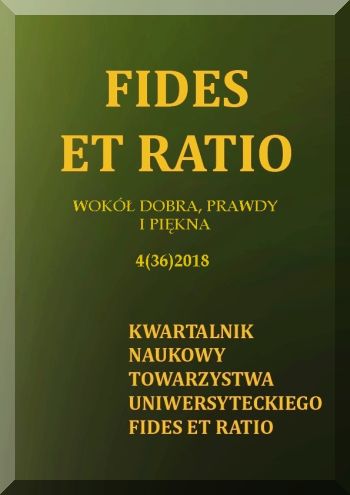Abstract
The aim of this article is to indicate the sources of the stance which the cultural and intellectual current called Transhumanism promotes. The Transhumanists situate the immortality argument for the Christian faith within the range of rational and worldly design. Their basic thesis is as follows: thanks to technological development, modern man has entered the transhuman phase which stands only as a bridge to the achievement - thanks to even more perfected technology - of the post-human status. The tension that has arisen between the theory concerning the new human and the practical realization of this project is today one of the elements of the wide interdisciplinary debate about the future shape of humankind.
A thinker who particularly stood out as a technological visionary was the 19th century Russian Orthodox philosopher Nikolai Fedorov. He was the author of the most anti-Thanatotic scientific project from which the Transhumanists, infected by the idea of immortality, derive their beliefs. The main idea on which world Transhumanism is built is an opposition to death. Because of ever more perfected technology, the boundaries of death are to be drastically shifted and ultimately lifted. Through technology the future human (posthuman) is supposed to attain immortality. In this article I will thus refer to the concept of this philosopher who wanted to prove that defeating the forces of nature and her most absurd fruit, which is death, lie not only in fantastic theory or argument of faith. It is a practical task which a rational man should accomplish.
In spite of the fact that the basic thesis of Fedorov, which is disagreement with death, became the source of the position presented by the Transhumanists, it is easy to notice a definitive difference between them. In Transhumanism's attempt to lead the human being to the post-human status, it promotes pure techno-transcendence. In this way it excludes any support on the part of supernaturality which it simply refuses as an element that threatens the raison d'être of its system. Here in fact practice must manage by itself with the boldest theories and human ratio appears to be the subject of some new fides. But, in fact, in the development of the ability to direct nature Fedorov sees a chance on ever tighter cooperation between the human ratio and the omnipotence of God. He similarly doesn't only project a futuristic vision but reaches for an already accomplished fact: Christ raised the dead and he instructed his disciples to do the same. The theory of raising the dead thus has for Fedorov an ex-post nature. In other words, it describes that which has already been achieved thereby rendering the practice of raising the dead already confirmed, although it has not yet been disseminated.
References
Augustyn z Hippony, (1996) O Trójcy Świętej, tłumaczenie: M. Stokowska, Kraków: Wydawnictwo Znak.
Beck U. (2012), Społeczeństwo światowego ryzyka. W poszukiwaniu utraconego bezpieczeństwa, tłumaczenie B. Baran, Warszawa: Wydawnictwo Naukowe Scholar.
Bobryk J., (2016), Redukcjonizm, kognitywistyka, transhumanizm. Czasopismo Psychologiczne. Psychological Journal, nr 1, s.7–13.
Bortkiewicz P., (2015), Religia i Bóg w świecie transhumanizmu, Ethos, nr 111, s. 114-127.
Семенοва C. (2004), Философ будущего века: Николай Федоров, Москва.
Copleston F., (2005), Historia Filozofii, tom 6, tłumaczenie: J. Łoziński, Warszawa: Instytut Wydawniczy PAX.
Copleston F., (2009), Historia Filozofii, tom 4, tłumaczenie: J. Marzęcki, Warszawa: Instytut Wydawniczy PAX.
Fiodorow N., (2012), Filozofia wspólnego czynu, tłumaczenie: C. Wodziński,
M. Milczarek, Kęty: Wydawnictwo Marek Derewiecki.
Gaczewa A., (2017), Fiodor Dostojewski i Nikołaj Fiodorow w zwierciadle dialogu rosyjskiej filozofii i literatury, tłumaczenie: P. Sury, Kronos, nr 2, s. 148–161.
Gałuszko D., Ptaszek G., Żuchowska-Skiba D., (2016), Technokultura: transhumanizm i sztuka cyfrowa, Kraków: Wydawnictwo Libron.
Grabińska T.,(2015), Zagrożenia bezpieczeństwa społecznego w ideologii transhumanizmu, Kultura bezpieczeństwa. Nauka-Praktyka-Refleksje, nr 18, s. 52–73.
Jonas H., (1996), Zasada odpowiedzialności. Etyka dla cywilizacji technologicznej, tłumaczenie M. Klimowicz, Kraków: Wydawnictwo Platan.
Klichowski M., (2014), Narodziny cyborgizacji. Nowa eugenika, transhumanizm i zmierzch edukacji, Poznań: Wydawnictwo Naukowe UAM.
Krąpiec A., (1986), Człowiek i prawo naturalne, Lublin: Wydawnictwo Towarzystwa Naukowego KUL.
Kurzweil R., (2016), Nadchodzi osobliwość, tłumaczenie: E. Chodkowska, A. Nowo-sielska, Warszawa: Wydawnictwo Kurhaus.
Milczarek M., (2013), Z martwych was wskrzesimy. Filozofia Nikołaja Fiodorowa, Kraków: Wydawnictwo Uniwersytetu Jagiellońskiego.
More M., (2013), The Proactionary Principle, (w:)The Transhumanist Reader, M. More, N. Vita-More,258 – 267, Chichester: John Wiley&Sons.
Różanowski K. (2007), Sztuczna inteligencja: Rozwój, szanse, zagrożenia, Zeszyty Naukowe Warszawskiej Wyższej Szkoły Informatyki, nr 2, s. 109 - 135.
Špidlík T., (2000), Myśl rosyjska. Inna wizja człowieka. Warszawa: Wydawnictwo Księży Marianów.
Żylina-Chudzik J., (2008), Aktywistyczna eschatologia Mikołaja Fiodorowa jako pragmatyczna implikacja jego antropologii, Kraków: Instytut Filozofii Uniwersytetu Jagiellońskiego (praca magisterska dostępna na stronie: www.filozofiarosyjska.uz.zgora.pl)
